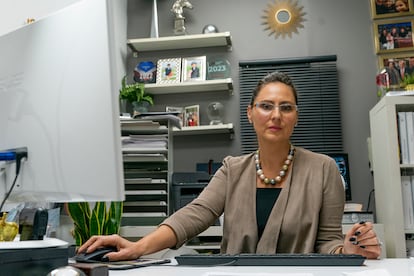Parents and children unite to fight online deepfake porn
Dorota Mani and her daughter are calling for federal legislation in the U.S. against artificially generated pornographic images

This year, parents and students at Westfield High School in New Jersey received an alarming email from the principal explaining that several students had created pornographic images of their female classmates using an artificial intelligence (AI) application.
In response to the incident, Dorota Mani and her 14-year-old daughter Francesca, who was a victim of these fake images, have become actively involved in the fight against deepfake porn, which is becoming increasingly common on the internet. While some states have introduced legislation to try to address the problem, experts point to the pressing need for federal legislation to regulate such activity comprehensively across the country.
In the case of the student body at Westfield, an investigation was launched into the distribution of these fake images on social media and, according to Mani, at least one student was suspended for a day. When asked by the news agency Associated Press if any additional disciplinary action had been taken, the school would not officially confirm whether that was the case. Parents of the victims have complained that the actions taken by the education authorities have amounted to an ineffective response to the situation.
Fake hyperrealistic videos mainly affect women. According to Sensity AI, a research company that tracks fake hyperrealistic videos on the internet, 90-95% of them are non-consensual pornography and nine out of 10 of these involve women.
Sign up for our weekly newsletter to get more English-language news coverage from EL PAÍS USA Edition
Tu suscripción se está usando en otro dispositivo
¿Quieres añadir otro usuario a tu suscripción?
Si continúas leyendo en este dispositivo, no se podrá leer en el otro.
FlechaTu suscripción se está usando en otro dispositivo y solo puedes acceder a EL PAÍS desde un dispositivo a la vez.
Si quieres compartir tu cuenta, cambia tu suscripción a la modalidad Premium, así podrás añadir otro usuario. Cada uno accederá con su propia cuenta de email, lo que os permitirá personalizar vuestra experiencia en EL PAÍS.
¿Tienes una suscripción de empresa? Accede aquí para contratar más cuentas.
En el caso de no saber quién está usando tu cuenta, te recomendamos cambiar tu contraseña aquí.
Si decides continuar compartiendo tu cuenta, este mensaje se mostrará en tu dispositivo y en el de la otra persona que está usando tu cuenta de forma indefinida, afectando a tu experiencia de lectura. Puedes consultar aquí los términos y condiciones de la suscripción digital.








































